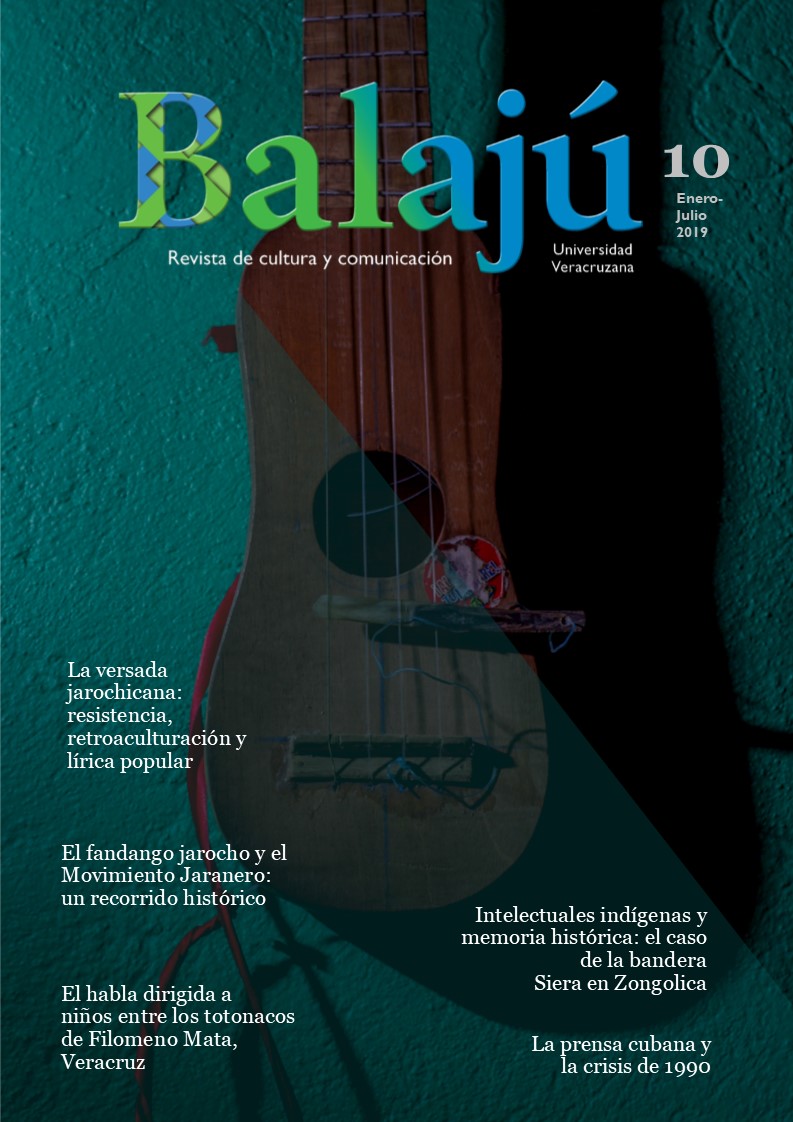Abstract
One of the most important battlefields in the struggle of Mexican-Americans against assimilation has been that of language, with a long history of progress, stagnation and setbacks that have accompanied the Chicano presence in the United States. Recent years have seen the emergence of a phenomenon known as retroacculturation, in which new generations of Mexican-Americans rediscover and revitalize the cultures of their ancestors. Within this process of revaluation, a transnational and transcultural movement known as the Movimiento Jaranero has vindicated the lyrical and musical practices of son jarocho, with original verses in Spanish as an increasingly important element of cultural resistance.
References
ACUÑA, Rodolfo (1976). América ocupada: los chicanos y su lucha de liberación. México: Era.
AZCONA, Stevan César (2008). Movements in Chicano Music: Performing Culture, Performing Politics, 1965-1979. Austin TX: University of Texas Press.
BURSTEIN, Sergio (2017). “Poder natural: Becky G es la primera superheroína latina de la pantalla grande, pero no deja de lado la música ni su defensa de los inmigrantes”, en Hoy Los Ángeles. Los Ángeles, 24 de marzo de 2017, p. 15.
CASTELLS, Manuel (2001). La era de la información: economía, sociedad y cultura. Volumen II: El poder de la identidad. 3a. ed., México: Siglo Veintiuno.
FIGUEROA HERNÁNDEZ, Rafael (2014). El son jarocho en los Estados Unidos de América: globalizaciones, migraciones e identidades. Tesis de doctorado. Xalapa: Universidad Veracruzana.
LAGO, Eduardo (2009). “Estados Unidos hispanos”, Humberto López Morales (coord.), Enciclopedia del español en los Estados Unidos. Madrid: Instituto Cervantes/Santillana.
MORRIS, Chris (2015). Los Lobos: Dream in Blue. Austin, TX: University of Texas Press.
ORTIZ, Fernando (1940). Contrapunteo cubano del tabaco y el azúcar: advertencia de sus contrastes agrarios, económicos, históricos y sociales, su etnografía y su transculturación. La Habana: J. Montero (Biblioteca de historia, filosofía y sociología).
SÁNCHEZ GARCÍA, Rosa Virginia (2005). “Hacia una tipología del son en México”, Acta Poética. 26 (1-2), pp. 399-424.
SÁNCHEZ-TELLO, George B. (2012). Jaraner@: Chicana/o Acculturation strategy. Tesis de maestría en Estudios Chicanos, California State University, Northridge, California.
TORRES GARCÍA, David Humberto (2015). Música en resistencia: el discurso de Quetzal, Las Cafeteras, Cambalache y Chicano Son a través del son jarocho. Tesis de maestría. Xalapa: Universidad Veracruzana.
VALDÉS, M. Isabel (2008). Hispanic Customers for Life: A Fresh Look at Acculturation. Ithaca, Nueva York: Paramount Market Publishing.
VALENZUELA ARCE, José Manuel (1998). El color de las sombras: chicanos, identidad y racismo. México: Plaza y Valdés.
Discografía
IMAGINE DRAGONS. “Thunder”. Recorded September 2016 - May 2017. Track 9 on Evolve. Interscope Records, 2017, CD.
LAS CAFETERAS. “La Bamba rebelde”. Banda 7 en It’s Time. Las Cafeteras Music, 2012, CD.
CAMBALACHE “Tilingo gringo”. Banda 4 en Constelación de sonidos. Cambalache, 2017, CD.
CHICANO SON. “Fandango sin fronteras”. Banda 1) en Fandango sin fronteras. Chicano Son, 2013, http://chicanoson.com/.
LOS LOBOS DEL ESTE DE LOS ÁNGELES. “El tilingo lingo”. Banda 14 en Rolas de Aztlán: Songs of the Chicano Movement, Smithsonian Folkways Recordings, 2005, CD.
SON DEL CENTRO. “Presidente”. Banda 5 en Son del Centro. Sin datos de edición, (CD).
VILLALOBOS BROTHERS. “María Chuchena”. Banda 3 en Aliens of Extraordinary Ability, Villalobos Brothers, 2012, CD.
Videografía
SCOTT, Ed. Director. Los Lobos del Este de Los Ángeles. Serie La Cultura, KCET Community Television of Southern California, 1975 (https://youtu.be/sfpdejgOBpk).

This work is licensed under a Creative Commons Attribution-NonCommercial 4.0 International License.
Copyright (c) 2020 Universidad Veracruzana


